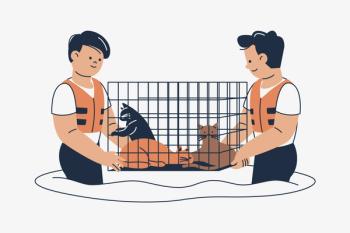
The Internet Vet: Texas DVM claims license suspension violates free speech
The Institute for Justice has taken up the cause of Dr. Ron Hines, suspended after dispensing veterinary 'advice' through his website, claiming it violates his right to free speech.
Forced to leave private practice 12 years ago, Ron Hines, DVM, PhD, decided to take to the Internet.
He launched a site, 2ndchance.info, to publish articles on animal health and soon began answering specific medical questions from his readers.
Now a resident of Brownsville, Texas, Hines was recently found to be in violation of the state’s veterinary practice act due to the “Ask a Vet” component of his website. The Texas Board of Veterinary Medical Examiners executed a disciplinary order March 25 to cease his veterinary correspondence and suspend his license with probation for one year.
Now, with the muscle of the Institute for Justice civil liberties law firm behind him, Hines is suing the Texas veterinary board for violating his First Amendment right to free speech.
A little friendly advice
The Texas state board calls Hines’ actions practice. The Institute of Justice contends they constitute free speech. According to Hines, he’s just giving friendly advice.
Institute for Justice attorney Jeff Rowes has taken Hines’ case against the Texas board. He contends the veterinary practice act attempts to regulate what is nothing more than speech. “All Ron’s doing is communicating with grown adults about things they wanted to hear and the First Amendment protects that,” Rowes says. “It doesn’t matter what you call it—does he practice, advise or anything else—he’s communicating and it cannot be banned unless there’s a compelling reason to do so.”
The state board, however, says that while it has no problem with the sharing of general veterinary knowledge, Hines crosses the line into the practice of veterinary medicine when addressing the medical inquiries of a specific patient and breaks the law in doing so without a physical examination. “We believe the state law is very clear,” says Texas Board of Veterinary Medical Examiners Executive Director Nicole Oria.
State law requires a patient-client-veterinarian relationship established by a physical exam to practice veterinary medicine. A state statute adopted in 2005 further defines that the relationship cannot be established by electronic means.
Rowes’ rebuttal? The veterinary practice laws are antiquated. “Technology has obliterated traditional geographic borders,” he says. “It is now possible for someone like Dr. Hines in Texas to communicate effectively and cheaply with anyone in the world. It’s protected by the First Amendment and cannot be stopped by obsolete regulatory approaches. All Dr. Hines is doing is talking to another adult. It can’t be arbitrarily restricted by the Texas government by calling it practice—it’s speech no matter what you call it.”
Hines says he’s never tried to define practice; he’ll leave that to his lawyer. “It’s not my high card, this type of bureaucracy and legal hair-splitting,” Hines says. “I’ll let other people decide what the definition of practice is.”
He says he’s simply lived by the golden rule—he’s tried to do what he thought was right. “Animals have been the center of my life. If someone asked me a question, I told them what I would do if it were my pet,” he says.
Hines makes the process sound benign, even undeserving of so much attention, but for Rowes, it’s huge. “His legal challenge addresses one of the most important unanswered questions in First Amendment law: When does the power of state governments to regulate occupations within their borders justify censoring personal advice?” Rowes says. The outcome could bolster or dismantle what has been a fundamental tenet of veterinary practice upheld by the American Veterinary Medical Association (AVMA) and state boards across the country and its effects could be far-reaching. “I never expected to be in federal court or to get cross-wise with the Texas board,” Hines says. “But I sure did.”
A second chance
Forbidden to answer e-mails from his website that continue to fill his inbox, Hines, nearly 70, spends his time tending to beehives at his home. He tinkers with his 1953 MG TD. Occasionally he’ll write an article for his website, but he finds it difficult to leave e-mails unanswered. “I never know if one of those e-mails is actually from the board,” he says.
Still, Hines’ connection to the veterinary world makes him feel useful and relevant, he says. He’s had some hard times—when he was living and practicing in Florida, he faced allegations of gross medical negligence and practicing veterinary medicine under the influence of narcotics by the state board in 2003. His Florida license was lost to emergency suspension in February of 2004. His marriage fell apart and the divorce proceedings forced him to sell his animal hospital and the real estate for his animal refuge, named 2nd Chance.
Hines is permanently disabled due to a fall that crushed his spine while he worked at a primate facility with the U.S. Public Health Service in 1973. He took prescription painkillers under the care of his doctor to manage chronic pain. Despite his disability, Hines said he couldn’t walk away from veterinary practice. “I enjoyed working with animals. I didn’t want to stop. It wasn’t easy,” he says. Managing the pain kept him on his feet and working. “I probably ended up taking more than I probably should have,” Hines says. “They decided I needed to go to a program to manage it.”
Hines entered a rehabilitative peer assistance program and within the year forfeited his Florida license and moved to Texas to be near his mother. “That was a difficult time in Ron’s life,” Rowes says. “I don’t think it implies that he isn’t an excellent veterinarian. It’s a footnote.”
Hines was granted clearance to practice veterinary medicine in 2006 and activated his Texas license. He says in light of everything that happened, he stayed too long in private practice. “I probably should’ve gone to the Internet earlier,” he says.
His mission
Hines says he’s called to do veterinary work through his website. He believes he is helping people and animals and that what he does is healthy for the profession.
He says before today’s technological advances, it was necessary for veterinarians to be on site to physically examine an animal, but he now believes he can be helpful without laying hands on the pet. “Times have changed,” he says. He encourages clients to send him whatever medical records and information they have, including lab reports and photos. He says he always recommends clients visit their local veterinarian.
Rowes argues that Hines is at least licensed to execute profession judgment. “People ask him a question and he does his very best within the constraints of the Internet to help,” he says. “[The law says there’s] no circumstance to execute that judgment without that physical examination and that’s just false. A licensed veterinarian is trusted to give relevant professional advice under the circumstances. If a veterinarian can give good advice under the limitations of the Internet, that should be perfectly legal.”
Those limitations are acknowledged on the site’s “terms of use” page, which explains that he cannot be a reader’s veterinarian. “Because he does not actually get to examine your pet, a doctor-patient-client relationship will not exist between you and Dr. Hines and it is not his intention to establish a veterinarian-client-patient relationship or engage in the practice of veterinary medicine as defined by Texas law,” the disclaimer states. Hines and Rowes maintain he is not “practicing” veterinary medicine on the Internet. “I never claimed to be able to treat animals over the Internet. I don’t have special powers or anything,” Hines says.
But that’s not good enough for the Texas board as long as he is giving advice to clients regarding a specific patient. “There are things that you couldn’t possibly know without doing an exam. It is difficult often for the public or even a veterinarian when they haven’t seen an animal,” says Oria, the Texas state board director. “An exam is an essential part and you can’t do that by electronic means.”
Hines says he is simply giving his clients more information when his general articles on animal health aren’t enough. Hines says he often explains what a veterinarian tells the client so they better understand it.
He says it’s hard for people to accept when a veterinarian says he or she can actually do very little to help a pet when it’s seriously ill. “They need someone to rely on, someone to trust, and I try to let them down gently,” he says. “You wouldn’t believe some of the things people write me. I try to be a pastor to them. Sometimes I tell them they’re doing the right thing. People like to hear that.”
He says he simply doesn’t understand why this practice is illegal and hopes a younger generation of veterinarians will follow in his footsteps. Hines doesn’t know how much longer he’ll continue working, but he says if the court rules in his favor, he’ll be back answering e-mails. “If my health holds out, as long as I have something to contribute, I’ll do it,” he says.
Newsletter
From exam room tips to practice management insights, get trusted veterinary news delivered straight to your inbox—subscribe to dvm360.





